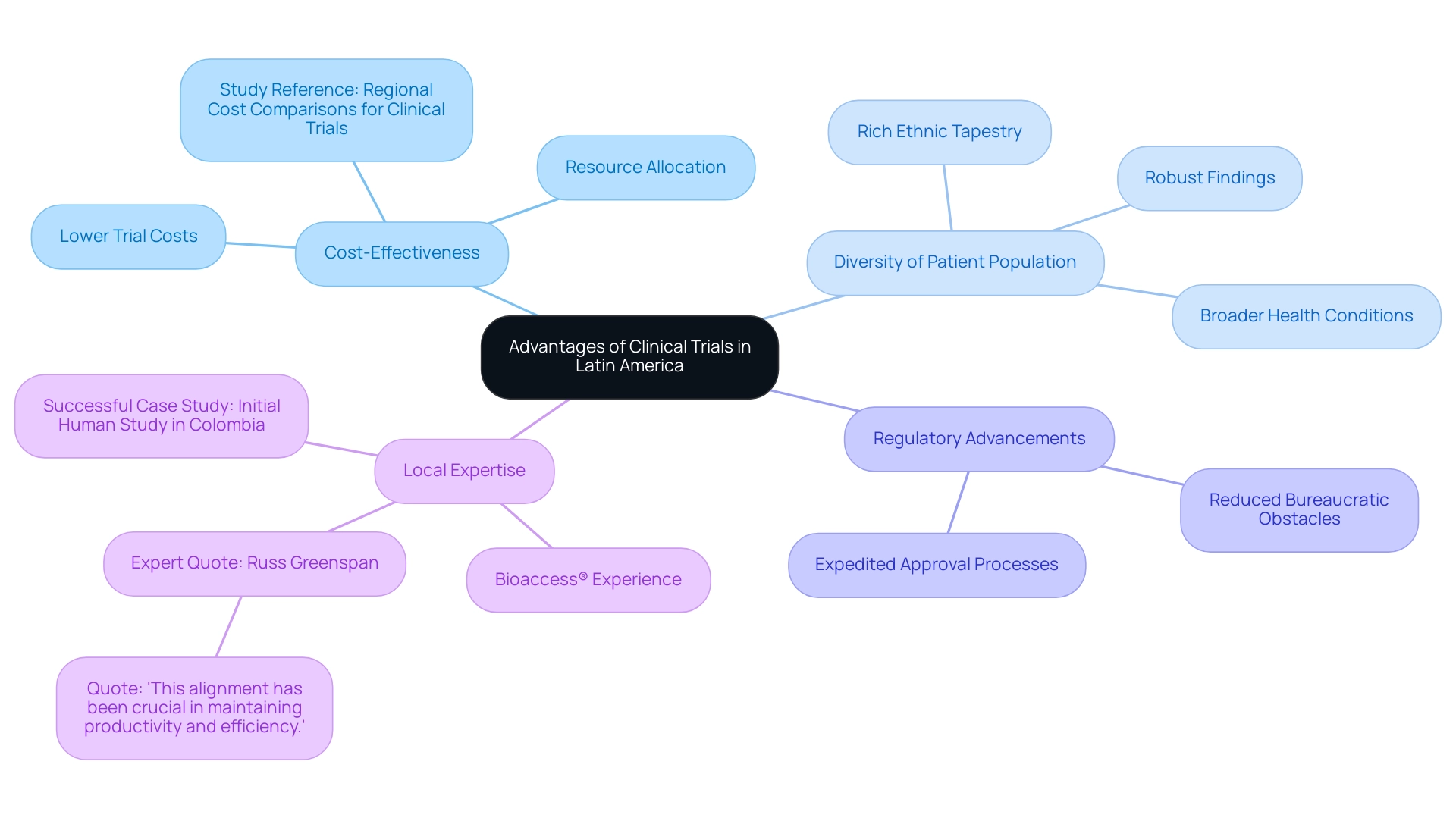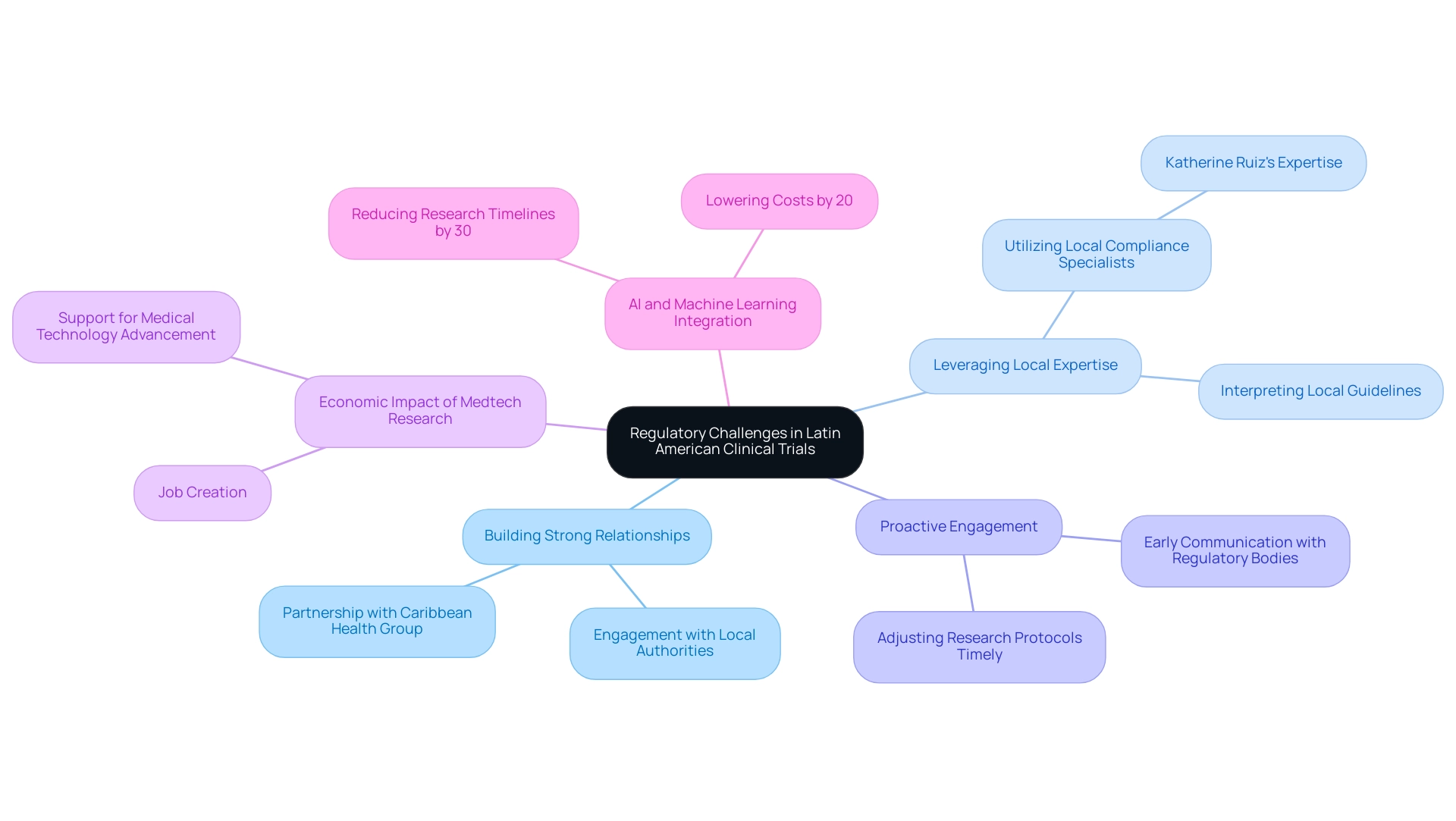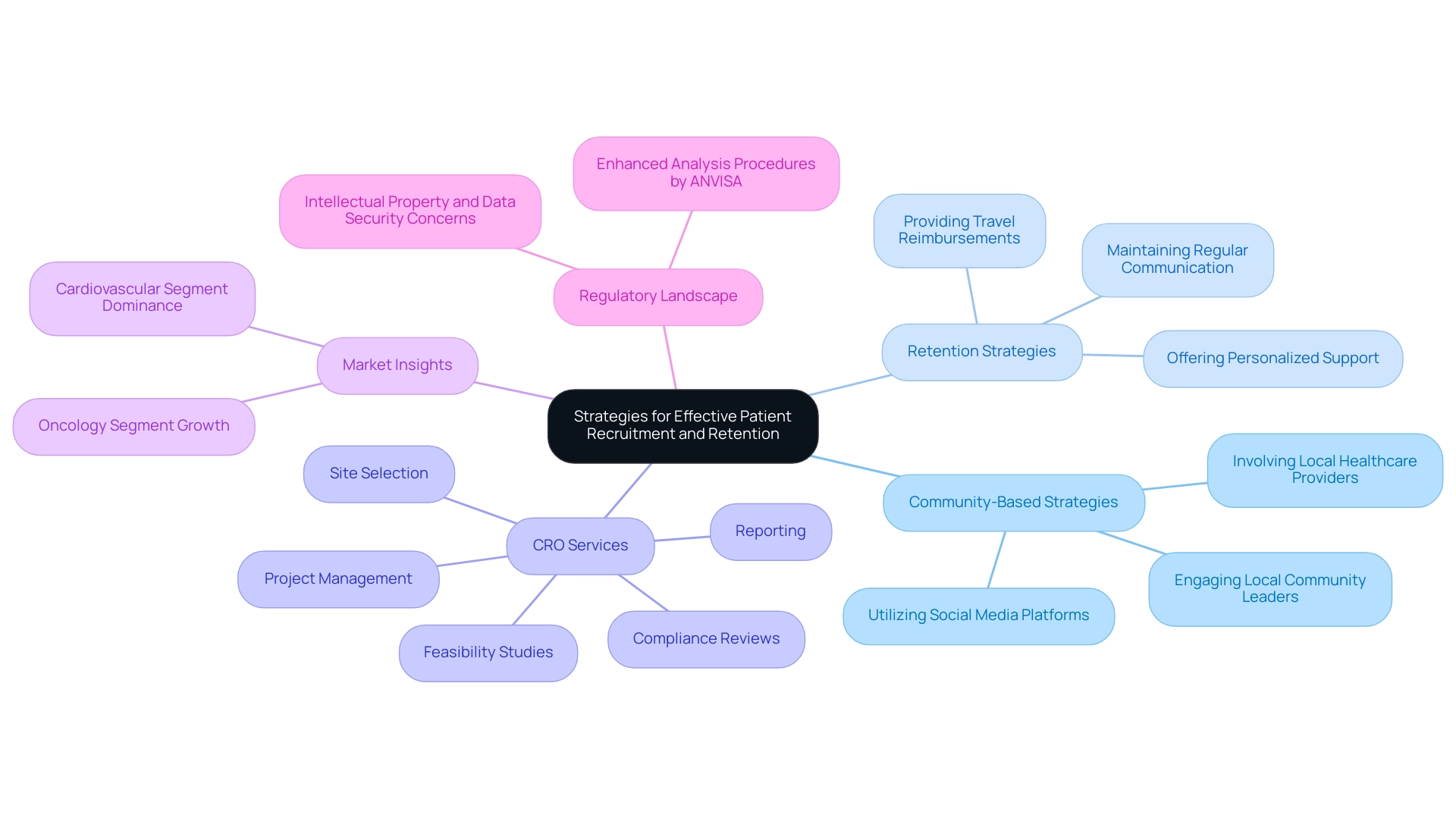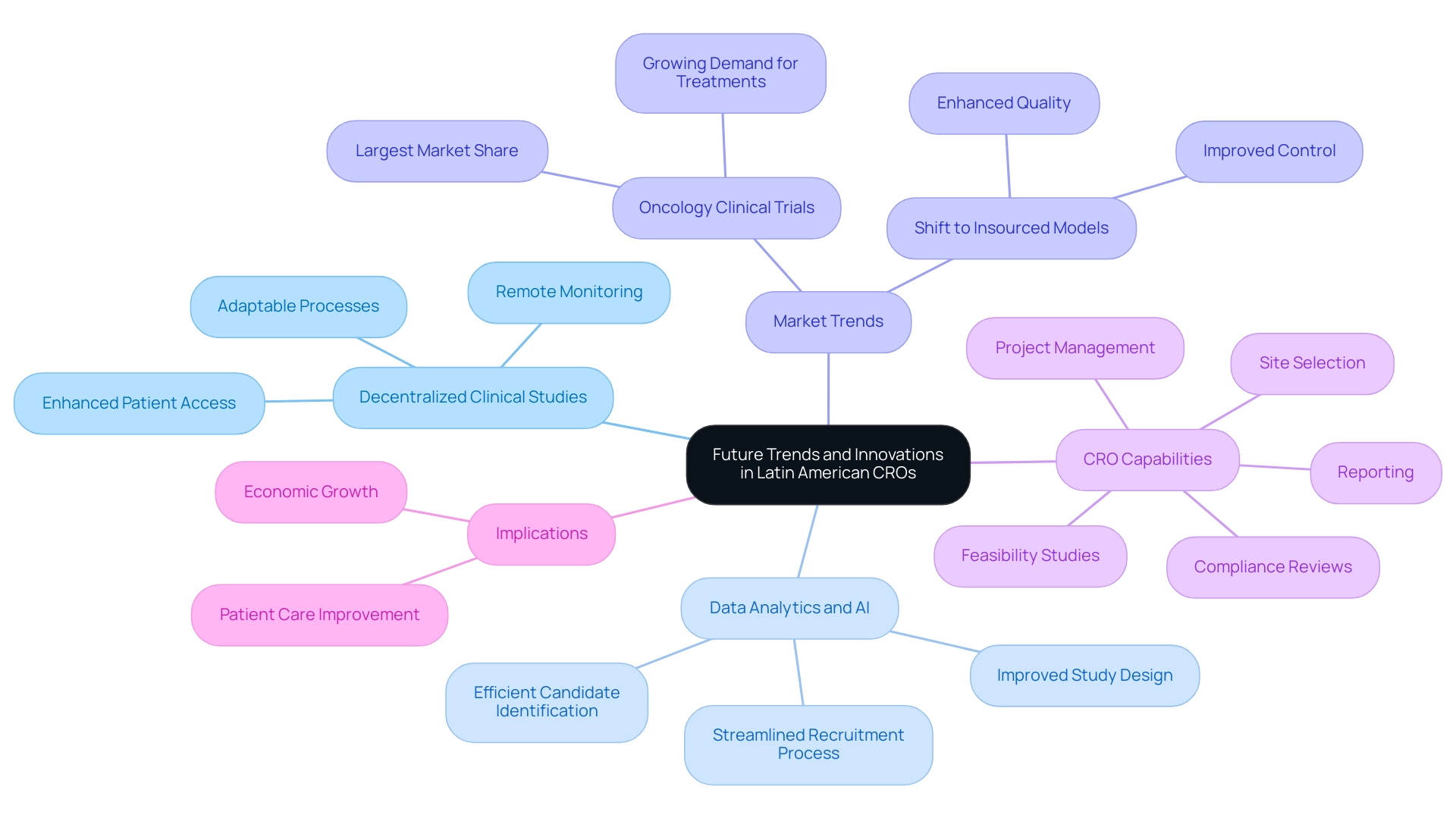Overview
The article highlights the significant opportunities that Contract Research Organizations (CROs) present in Latin America for enhancing clinical trial success. It emphasizes their pivotal role in streamlining processes and reducing costs, which is essential for Medtech companies.
By detailing how CROs facilitate:
- Regulatory compliance
- Patient recruitment
- Efficient project management
The article underscores the importance of these elements in accelerating the development and approval of innovative medical devices. In a diverse and economically advantageous environment, collaboration with CROs emerges as a strategic advantage for navigating the complexities of clinical research.
Introduction
As the landscape of clinical research evolves, the role of Contract Research Organizations (CROs) in Latin America has become increasingly vital. Their extensive array of services—from study design to regulatory compliance—positions CROs not merely as support systems but as essential partners in the journey of medical innovation.
With the growing demand for efficient and cost-effective clinical trials, Latin America emerges as a promising hub, attracting Medtech companies eager to navigate the complexities of research while benefiting from a diverse patient population and improved regulatory frameworks.
This article delves into the multifaceted advantages of conducting clinical trials in this region, explores strategies for overcoming regulatory challenges, and examines the innovative trends shaping the future of CROs, highlighting how these organizations are poised to redefine the clinical research paradigm in Latin America.
Understanding the Role of CROs in Latin America
Contract Research Organizations (CROs) serve as pivotal partners within the clinical research ecosystem, particularly in the context of numerous opportunities across Latin America. They deliver a comprehensive array of services, encompassing:
- Study design
- Regulatory compliance
- Patient recruitment
- Project initiation
- Project management
- Data management
At bioaccess®, we are dedicated to enhancing medical device evaluations through meticulous feasibility assessments, strategic investigator selection, and adherence to rigorous standards, ensuring a streamlined process that bolsters both efficiency and cost-effectiveness.
As we look toward 2025, the significance of CROs in Latin America is increasingly recognized as essential for navigating the complexities of research studies. Our expertise empowers Medtech companies to efficiently secure regulatory approvals, initiate research sites, and recruit subjects with agility. This collaboration is not merely advantageous; it is vital for accelerating the development of innovative medical devices, as demonstrated by our successful partnerships, including our work with Welwaze Medical Inc. on the launch of the Celbrea® device in Colombia.
Current statistics reveal that the healthcare CRO market is undergoing substantial growth, with projections indicating an increase from USD 50.38 billion in 2023 to USD 93.23 billion by 2032, representing a compound annual growth rate (CAGR) of 7.10% from 2024 to 2032. According to Akash Anand, Head of Business Development & Strategy, "the global Healthcare Contract Research Organization (CRO) Market size was valued at USD 50.38 billion in 2023 and is projected to reach USD 93.23 billion by 2032, growing at a CAGR of 7.10% from 2024 to 2032." This growth underscores the rising reliance on CROs for the effective execution of clinical studies.
In comparison, the U.S. healthcare CRO market maintained the largest share in 2024, further highlighting the importance of Latin America CRO opportunities as these organizations continue to evolve and meet the demands of the Medtech sector.
Industry leaders stress the critical role of CROs in the Medtech landscape. Their insights reveal that successful partnerships between CROs and Medtech companies can yield enhanced study outcomes and expedited regulatory approvals. For instance, our collaboration with GlobalCare Clinical Trials has led to over a 50% reduction in recruitment time and 95% retention rates, exemplifying the effectiveness of our cooperative approach.
As Medtech firms persist in their quest for innovative solutions to research challenges, Latin America CRO opportunities will remain indispensable. Their expertise not only ensures compliance and efficiency but also cultivates an environment conducive to the advancement of groundbreaking medical technologies, ultimately benefiting patients and healthcare systems alike. Recent investments in research technology platforms further illustrate ongoing trends within the CRO sector, emphasizing the crucial role these entities play in advancing medical research.
To learn more about how bioaccess® can support your research needs, we invite you to schedule a meeting with us.

The Advantages of Conducting Clinical Trials in Latin America
Conducting medical studies in Latin regions presents numerous advantages that increasingly attract Medtech firms, particularly in collaboration with specialists like bioaccess®. A key factor is the notably lower cost of trials compared to North America and Europe. This cost-effectiveness allows companies to allocate resources strategically, thereby maximizing their investments in medical research.
For instance, a recent study titled "Regional Cost Comparisons for Clinical Trials" highlighted that while the U.S. ranks among the most expensive regions due to high labor costs and stringent compliance, Latin regions offer a more economical alternative without sacrificing quality. The research underscores the trade-offs between cost reductions and the logistical, regulatory, and ethical considerations of conducting studies in various locations, aiding sponsors in their decision-making processes.
Moreover, the diversity of the patient population in Latin regions enhances the applicability of study results. This area boasts a rich tapestry of ethnicities and health conditions, providing Medtech companies with a unique opportunity to gather data that mirrors a broader spectrum of the global population. Statistics indicate that clinical studies conducted in Latin America often encompass diverse patient demographics, leading to more robust and applicable findings.
In addition to cost and diversity, many Latin American countries have made significant advancements in refining their regulatory frameworks. These improvements have led to expedited approval processes and diminished bureaucratic obstacles, enabling companies to initiate trials more rapidly. This streamlined approach not only accelerates market access but also contributes to reduced development costs, positioning Latin America as an increasingly viable option for research studies.
As Russ Greenspan, CTO of PresenceLearning, remarked, "This alignment has been crucial in maintaining productivity and efficiency."
Furthermore, bioaccess® excels in managing various types of studies, including Early-Feasibility Studies (EFS), First-In-Human Studies (FIH), Pilot Studies, Pivotal Studies, and Post-Market Follow-Up Studies (PMCF). With over 20 years of experience in Medtech, their expertise and tailored approach are essential for navigating the complexities of medical studies in this region. Dushyanth Surakanti, Founder & CEO of Sparta Biomedical, shared his positive experience with bioaccess® during its initial human study in Colombia, highlighting the importance of local expertise in achieving successful outcomes.
Collectively, these factors present a compelling case for Medtech firms to explore CRO opportunities in Latin America, where they can achieve faster market access and substantial cost reductions while benefiting from a diverse patient base and enhanced compliance landscapes. Patricio Ledesma, Head of Clinical Operations at Sofpromed CRO, stresses the significance of leveraging local expertise to effectively navigate these advantages.

Navigating Regulatory Challenges in Latin American Clinical Trials
Navigating the regulatory landscape in Latin America presents unique challenges for contract research organizations (CROs) due to the diverse requirements established by each country's regulatory body. In 2025, adherence rates for research studies in the region remain a significant issue, with differing guidelines complicating the study process. To effectively carry out research studies, it is crucial for CROs, such as bioaccess®, and sponsors to stay well-informed about these regulations and engage with local authorities from the outset, especially to capitalize on the opportunities in Latin America.
Effective strategies for overcoming regulatory hurdles include:
- Building Strong Relationships: Establishing robust connections with regulatory agencies facilitates smoother interactions and fosters trust, vital for navigating the approval process. This is exemplified by bioaccess®'s partnership with Caribbean Health Group, which aims to position Barranquilla as a premier location for clinical research, leveraging Latin America CRO opportunities, supported by Colombia's Minister of Health.
- Leveraging Local Expertise: Utilizing professionals with in-depth knowledge of local regulations aids in accurately interpreting guidelines and ensuring compliance with Good Clinical Practice (GCP) standards. Katherine Ruiz, a specialist in compliance matters for medical devices and in vitro diagnostics in Colombia, exemplifies the local expertise necessary for navigating these complexities.
- Proactive Engagement: Early and ongoing communication with regulatory bodies can preempt potential issues, allowing for timely adjustments to research protocols. This proactive approach is crucial as government initiatives in Colombia actively promote trials as part of a broader strategy to transition into a knowledge economy by 2031, as noted by Julio G. Martinez-Clark, CEO of bioaccess®.
The economic impact of Medtech research underscores the opportunities within Latin America, significantly contributing to job creation and overall economic growth. Industry experts highlight that the growth of medical studies in the region creates opportunities that not only accelerate clinical research efforts but also support the advancement of medical technologies that enhance patient outcomes. Furthermore, the incorporation of AI and machine learning is anticipated to reduce research timelines by up to 30% and lower costs by as much as 20%, providing additional tools for managing compliance challenges.
By addressing these compliance challenges directly, companies can optimize testing operations, minimize delays, and ultimately introduce innovative medical devices to the market more effectively. The case study titled "Economic Impact of Medtech Research" demonstrates how Medtech research studies significantly enhance local economies, supporting the assertions regarding the economic importance of medical studies in the context of Latin America CRO opportunities. Moreover, bioaccess®'s extensive service capabilities, including setup, project management, and compliance reviews, further bolster their ability to navigate the regulatory landscape effectively.

Strategies for Effective Patient Recruitment and Retention
Successful patient enrollment and retention are essential for the success of research studies in Latin regions. To optimize recruitment efforts, contract research organizations (CROs) like bioaccess® should implement community-based strategies that resonate with local populations. Involving local healthcare providers fosters trust and promotes participation, while social media platforms serve as effective tools for outreach, enabling focused messaging that informs potential participants about the advantages of research studies.
As noted in discussions with industry leaders, "These challenges demand a strategic approach to recruitment."
Moreover, the importance of retention strategies cannot be overstated. Providing travel reimbursements, maintaining regular communication, and offering personalized support can significantly enhance participant engagement. Research suggests that retention rates in health studies throughout Latin regions can be enhanced by as much as 30% when these strategies are effectively utilized.
The cardiovascular segment held the largest share of the market in 2024, underscoring the significance of tailored recruitment strategies in this area. Additionally, the oncology segment is anticipated to expand significantly due to the rising prevalence of cancer and government investments in cancer research, further highlighting the need for effective recruitment methods.
Effective community-focused recruitment approaches have been demonstrated in several case studies, including the partnership between bioaccess® and Caribbean Health Group, which seeks to establish Barranquilla as a prominent location for Latin America CRO opportunities and clinical studies. Initiatives that involve local community leaders in the recruitment process have proven effective in increasing awareness and participation rates. Furthermore, with the recent implementation of enhanced analysis procedures by ANVISA in Brazil, which allows the use of documentation from comparable foreign regulatory bodies, CROs can navigate the evolving regulatory landscape more effectively.
Alongside these strategies, bioaccess® provides extensive service capabilities, including:
- Feasibility studies
- Site selection
- Compliance reviews
- Setup
- Import permits
- Project management
- Reporting
By concentrating on these comprehensive strategies and addressing compliance risks related to intellectual property and data security, CROs like bioaccess® can ensure that studies are adequately powered, yielding robust and reliable data that ultimately advances the medical technology sector and contributes to local economic growth.

Future Trends and Innovations in Latin American CROs
The research landscape in Latin America is undergoing a significant transformation, creating new opportunities for Contract Research Organizations (CROs) driven by emerging trends and technological innovations. A pivotal trend is the increasing adoption of decentralized clinical studies (DCTs), which leverage advanced technology to enhance patient access and engagement. This innovative approach enables remote monitoring and data gathering, resulting in processes that are more adaptable and focused on patient needs.
Moreover, the integration of data analytics and artificial intelligence is revolutionizing how CROs design studies and recruit participants. These technologies facilitate the efficient identification of suitable candidates, streamlining the recruitment process and enhancing overall results. As Aditi Shivarkar, a healthcare market research expert with over 14 years of experience, observes, the landscape is evolving rapidly, necessitating that CROs adapt to maintain competitiveness.
In this context, bioaccess® distinguishes itself by offering extensive research management services, including:
- Feasibility studies
- Site selection
- Compliance reviews
- Setup
- Import permits
- Project management
- Reporting
- Review and feedback on study documents to meet country requirements
These capabilities ensure that medical studies not only meet compliance standards but also bolster local economies through job creation and improvements in healthcare.
As the regulatory environment continues to evolve, CROs that harness these advancements will be better equipped to satisfy sponsor expectations and enhance the effectiveness of research studies across the region. However, challenges persist, particularly in scaling metadata management, which many companies find difficult as they strive to optimize their operational capabilities.
Statistics indicate that the adoption rates of decentralized research studies are on the rise in Latin America, reflecting a broader shift towards more patient-focused methodologies. This evolution is not only improving the quality of data collected but also fostering greater trust and collaboration between sponsors and CROs. The transition towards sponsors possessing their data and processes signifies a shift from conventional outsourcing to more insourced models, enabling improved control and quality in research studies.
Vivienne van der Walle, Founder and Medical Director, emphasizes, "Anything that takes away time from patients is a pain point for a site, and anyone who resolves that is helping patient care." This underscores the importance of patient-focused strategies in research studies.
Furthermore, the oncology sector holds the largest share of the research market due to the rising incidence of cancer and the substantial number of oncology studies conducted globally. The demand for innovative solutions in medical research, particularly in oncology, is expected to continue increasing, driven by the need for effective cancer treatments and significant investments in oncology research.
In summary, the future of CROs in Latin America presents exciting opportunities, with decentralized clinical trials and technological innovations paving the way for more efficient and effective clinical research. Organizations like bioaccess® that embrace these changes will not only enhance their operational capabilities but also contribute significantly to the advancement of medical technologies that can improve patient care and drive economic growth through international collaboration.

Conclusion
The role of Contract Research Organizations (CROs) in Latin America is indispensable for advancing clinical research. By offering comprehensive services—from study design to regulatory compliance—CROs such as bioaccess® empower Medtech companies to conduct trials with greater efficiency and cost-effectiveness. The region's distinct advantages, including lower operational costs, a diverse patient population, and streamlined regulatory processes, position it as an attractive hub for clinical trials.
Collaborating successfully with local CROs can lead to expedited development timelines and enhanced trial outcomes, ultimately benefiting both healthcare systems and patients. The integration of innovative approaches, such as decentralized clinical trials and cutting-edge technologies like data analytics and artificial intelligence, is poised to further transform the clinical research landscape. These advancements will not only boost patient engagement but also enhance operational efficiency, fostering robust partnerships between sponsors and CROs.
In conclusion, the collaboration between CROs and Medtech companies in Latin America is vital for propelling medical innovation. By harnessing local expertise and embracing emerging technological trends, the future of clinical trials in this region appears promising, paving the way for groundbreaking medical solutions that elevate patient care and contribute to economic growth.
Frequently Asked Questions
What are Contract Research Organizations (CROs) and what services do they provide?
CROs are pivotal partners in the clinical research ecosystem, offering a comprehensive array of services including study design, regulatory compliance, patient recruitment, project initiation, project management, and data management.
How does bioaccess® enhance medical device evaluations?
bioaccess® enhances medical device evaluations through meticulous feasibility assessments, strategic investigator selection, and adherence to rigorous standards, ensuring a streamlined process that improves efficiency and cost-effectiveness.
What is the significance of CROs in Latin America for Medtech companies?
CROs in Latin America are increasingly recognized as essential for navigating the complexities of research studies, helping Medtech companies secure regulatory approvals, initiate research sites, and recruit subjects efficiently.
What is the projected growth of the healthcare CRO market?
The healthcare CRO market is projected to increase from USD 50.38 billion in 2023 to USD 93.23 billion by 2032, with a compound annual growth rate (CAGR) of 7.10% from 2024 to 2032.
How do CROs affect study outcomes and regulatory approvals?
Successful partnerships between CROs and Medtech companies can yield enhanced study outcomes and expedited regulatory approvals, as evidenced by collaborations that have significantly reduced recruitment times and improved retention rates.
What advantages do Latin American regions offer for conducting medical studies?
Latin American regions offer lower trial costs compared to North America and Europe, a diverse patient population that enhances the applicability of study results, and improved regulatory frameworks that expedite approval processes.
What types of studies does bioaccess® manage?
bioaccess® manages various types of studies including Early-Feasibility Studies (EFS), First-In-Human Studies (FIH), Pilot Studies, Pivotal Studies, and Post-Market Follow-Up Studies (PMCF).
Why is local expertise important in conducting studies in Latin America?
Local expertise is crucial in navigating the complexities of medical studies in Latin America, ensuring successful outcomes and efficient processes, as highlighted by experiences shared by industry leaders.
How does the diversity of the patient population in Latin America benefit clinical studies?
The diverse patient population in Latin America provides Medtech companies with the opportunity to gather data that reflects a broader spectrum of the global population, leading to more robust and applicable findings.
What is the overall appeal of conducting research studies in Latin America for Medtech firms?
Latin America presents a compelling case for Medtech firms due to faster market access, substantial cost reductions, a diverse patient base, and enhanced compliance landscapes, making it an increasingly viable option for research studies.

